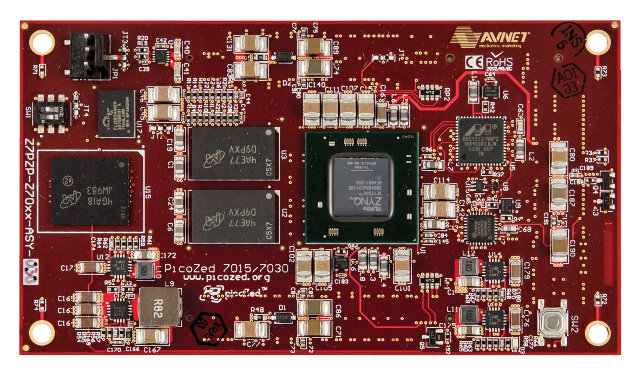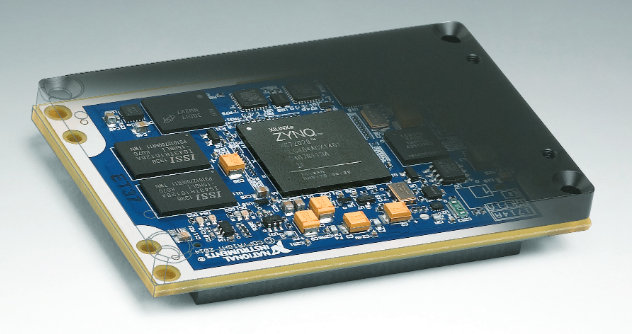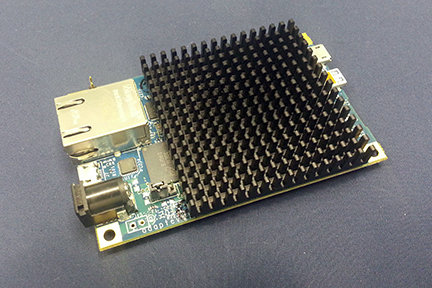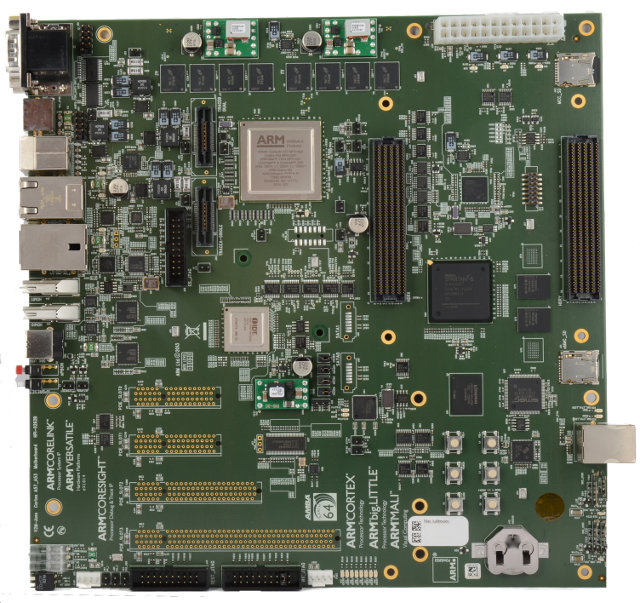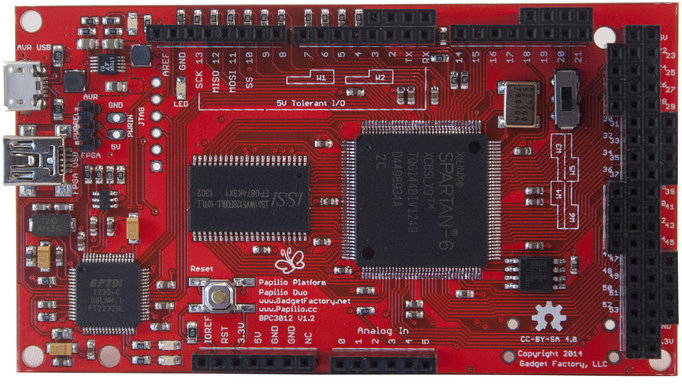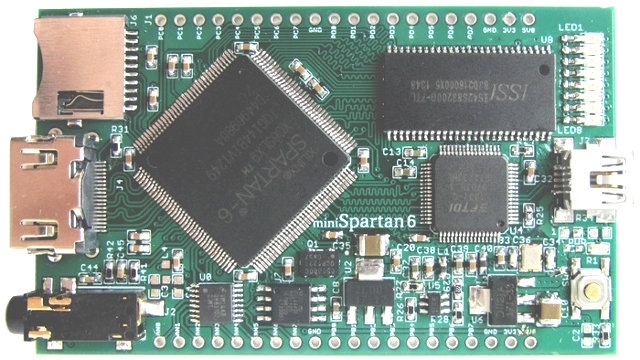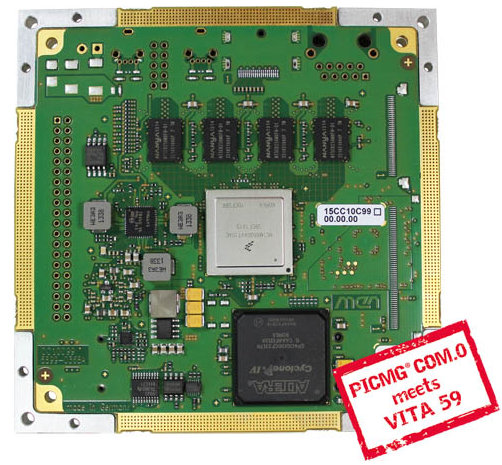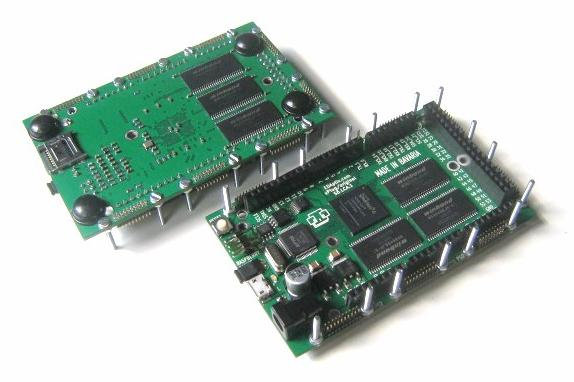After the Zedboard, and the Microzed, here comes PicoZed, a family of system-on-modules (SoM) based on Xilinx Zynq-7000 SoCs featuring a dual core Cortex A9 processor and FPGA fabric. The module also comes with 1GB RAM, 4GB eMMC, Gigabit Ethernet PHY, various user I/O, and more. Target applications include embedded vision, test & measurement, motor control, software-defined radio, and industrial automation. Four modules are available with support for commercial or industrial temperature ranges, all sharing the following specifications: SoC (depending on module) Xilinx Zynq-7010 with two Cortex-A9 cores @ 866MHz, FPGA with 28K Logic Cells Xilinx Zynq-7015 with two Cortex-A9 cores @ 866MHz, FPGA with 74K Logic Cells, 4 transceivers @ 6.25 Gb/s Xilinx Zynq-7020 with two Cortex-A9 cores @ 866MHz, FPGA with 85K Logic Cells Xilinx Zynq-7030 with two Cortex-A9 cores @ 1GHz, FPGA with 125K Logic Cells, up to 4 transceivers @ 12.5 Gb/s System Memory – 1GB […]
National Instruments Introduces NI sbRIO-9651 SoM Based on Xilinx Zynq SoC Running Linux Real-time OS
National Instruments has recently announced NI sbRIO-9651 System on Module (SoM) powered by Xilinx Zynq-7020 dual core Cortex A9 + FPGA SoC, based on LabVIEW RIO architecture used in products such as myRIO, and coming with a complete middleware solution as well as NI Linux Real-Time OS. NI sbRIO-9651 hardware specifications: SoC – Xilinx Zynq-7020 with two ARM Cortex-A9 cores @ 667MHz and Artix-7 FPGA with 85K Logic Cells System Memory – 512MB DRAM Storage – 512MB flash Dedicated processor I/O: Gigabit Ethernet USB 2.0 Host, USB 2.0 Host/Device RS232 (TX/RX) SHDC FPGA I/O: 160 single-ended FPGA I/O Configurable peripherals: Gigabit Ethernet, 3x RS232, 2x RS485, 2x CAN Power Consumption – 3 to 5 Watts (typical) Dimensions – 50.8 x 78.2 mm Temperature range – -40 to 85 °C NI SoM is said to integrate a validated board support package (BSP) and device drivers with the MI Linux Real-time OS. […]
Adapteva Announces Three Parallella Fanless Boards for Microserver, Desktop, and Embedded Applications
Adapteva’s Parallella low cost open source hardware “supercomputer” is a board powered by Xilinx Zynq-7010/7020 dual core Cortex A9 + FPGA SoC and the company’s Ephipany epiphany coprocessor, that’s had a successful Kickstarter campaign in 2012 as the 16-core version sold for just $99, and is capable of handling applications such as image and video processing, and ray-tracing, and also comes with an OpenCL SDK. The board was fairly difficult to source after the crowdfunding campaign, and one the common complain of backers was the board had to be actively cooled by a fan. The company has fixed both issues by increasing slightly the price, and redesigning the board so that it can be passively cooled by a larger heatsink. There are now three versions of the parallela board: Parallella Microserver ($119) – Used as an Ethernet connected headless server Parallella Desktop ($149) – Used as a personal computer Parallella […]
Linaro Announces 64-bit ARM Android Port on Juno ARM Development Platform
Last week, Linaro 14.06 was released and one of the highlights was Android booting on ARMv8 models, but the organization has actually ported Android to a new 64-bit ARM platform. Juno ARM Development Platform is actually software development platform for ARMv8-A, including Juno Versatile Express board and an ARMv8-A reference software port developed by Linaro. Juno VExpress Board has the following key hardware features: SoC – 2x ARM Cortex A57 cores @ 1.1 GHz (2MB L2 cache), 4x Cortex A53 cores @ 850 MHz (1MB L2 cache) in big.LITTLE configuration with Mali-T624 GPU @ 600 MHz. Compliant with SBSA specifications Level 1. I/O FPGA – Xilinx SPARTAN-6 MCU – ARM Cortex M3 for Motherboard Configuration Controller (MCC) System Memory – 8GB DDR3L @ 1600 MHz Storage – User and configuration micro SD card lots, 64MB NOR flash, configuration EEPROM Connectivity – 10/100M Ethernet + 10M “configuration” Ethernet Video Output – […]
$88 Papilio DUO Arduino Compatible Board with a Xilinx FPGA Let You to Draw your Own Circuits
In a concept similar to Arduissimo, Papilio DUO is an Arduino compatible board with a Xilinx Spartan-6 FPGA, but it adds a real Atmel AVR MCU, and instead of going the Indiegogo route, the project has launched on Kickstarter, and already reached its $30,000 funding target with 13 days to go. Instead of writing VHDL code, a drag and drop graphical tool called DesignLab will help you build your own circuits more easily. Let’s go through the hardware specifications first: FPGA – Xilinx Spartan 6 LX9 FPGA System Memory – 512KB or 2MB ISSI IS61WV5128 SRAM Storage – 64Mbit Macronix MX25L6445 SPI Flash MCU – Atmel AVR ATmega32U4 (Same as Arduino Leonardo) USB – 1x micro USB port connected to the Atmel MCU, 1x mini USB port connect to the FPGA I/Os 54 I/O pins available via Arduino Mega headers 0-16 Digital Pins connected to FPGA and ATmega32U4 JTAG Power – High […]
$69 miniSpartan6+ Board with Xilinx Spartan 6 FPGA Features an HDMI Port (Crowdfunding)
I’ve already featured sub-$100 Xilinx Spartan 6 boards in this blog such as The Mojo and Arduissimo. There’s now another with Scarab Hardware‘s miniSpartan6+ which also includes an HDMI port, and is currently available for $69 on Kickstarter. This board could be used as a logic analyzer, a multimedia player, a game console emulator, an Arduino emulator, a stereo vision camera, and more. miniSpartan6+ specifications: FPGA- Xilinx Spartan6 LX9 System Memory – 32 MB SDRAM Storage – 64Mbit SPI Flash + micro SD card Video Output – HDMI Audio Output – Stereo audio output jack using 1-bit sigma-delta DAC USB – Micro USB OTG port Debugging – On-board USB JTAG programmer I/Os via breadboard friendly through holes 8-channel ADC running at 1 MSPS with 8 bit resolution. 24 Digital I/O pins. Misc – 8 LEDs. Dimensions – 4.57 x 7.62 cm Programming can be done with the company’s Scarab IDE, […]
ARM Based COM Express Modules by MEN Mikro Electronik and Pactron
A few days ago, in a post listing different system-on-module (SoM) standards, I mentioned COM Express standard was targeting SoMs based on x86 processors, and SMARC was the equivalent for ARM. I still understand it’s the case as COM Express standard defines mechanical dimensions that are usually larger than SoM standard for low power processors, some buses found in ARM and x86 are different (e.g. AFAIK LPC and PCI are not found in ARM SoC), and the standard supports high power signals which are not needed in ARM or MIPS processors. Having said that, I’ve been pointed out to two ARM based COM Express modules, which could make sense if you want to use an ARM based module using existing COM Express compatible baseboards. The COM Express modules below feature Freescale i.MX6 and Marvell Armada XP SoCs, and have been designed respectively by MEN Mikro Electronik and Pactron. MEN Mikro […]
Meet Arduissimo, a Multi-core Arduino Board with a 16-core Xilinx Spartan FPGA (Crowdfunding)
Arduissimo a MultiCore Arduino project based on an FPGA Arduino Board powered by Xilinx Spartan LX6. It supports virtual peripherals, and allows you to configure PWMs, I2Cs, SPIs, and more on any of the 124 General Purpose IOs available through the board. Arduissimo specifications: FPGA – Xilinx Spartan-6 LX16 CSG326 -2 System Memory SDRAM Interface 1 – 1x 256MBit, 4x 64MBit, 166MHz SDRAM Interface 2 – 1x 64MBit, 166MHz Storage – EEprom for configuration file + micro SD card slot (4 pins connected to FPGA) USB – High Speed USB, FTDI HS2232HL (13 pins for “245 fifo sync” connected to the FPGA) 124 IOs: 4 IOs – 2.54mm header (e.g. Raspberry Pi) 72 IOs: Arduino Mega footprint (44 IOs shared with uPlug) 92 IOs: 8 uPlug connector slots (44 IOs shared with Arduino Mega) 50MHz oscillator Misc – Reset switch, 1x yellow LED, 4x bumpers Dimensions – 98.5 mm x […]


